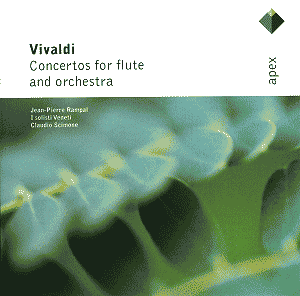Although Vivaldi was a virtuoso violinist and
wrote prolifically for that instrument he was able to compose
imaginatively and expertly for a wide range of combinations of
instruments. Vivaldi would certainly have been aware of the possibilities
for flute writing as owing to its high register the instrument
can penetrate a full string section without the fear of being
drowned-out in tutti passages. Consequently Vivaldi left
the catalogue with at least fifteen concertos for solo flute,
strings and basso continuo and over double that number also featuring
the flute as a solo instrument or in other instrumental combinations.
The flute as a solo instrument took some time
to become popular in Italy although it had been widely composed
for in northern Europe. The flute became especially fashionable
in Germany where Johann Quantz the court composer for Frederick
the Great was particularly prolific, composing an amazing several
hundred works for the flute. It is likely that Vivaldi’s inspiration
for writing specifically for the flute came following the visit
of Quantz to Venice in 1726 where Vivaldi was in station at the
Pio Ospedale della Pieta. Despite Vivaldi’s slow association with
the flute the six Opus 10 concertos seem to be the first in Europe
to appear in print when published by Le Cene of Amsterdam in 1728.
I understand that five of the set of six Opus
10 concertos were arrangements that Vivaldi made of his recorder
concertos or from chamber concertos which included a flute or
recorder. It is possible that concerto No. 4 of the set is the
only original flute concerto composition; although an original
version could have been lost or destroyed.
For the flute as with the recorder Vivaldi often
used these high pitched instruments to attach certain imaginative
subjects such as birdcalls, pastoral and romantic themes etc.
Clearly Vivaldi’s listening public were perceptive to the clever
use of providing his works with programmatic and descriptive titles;
a marketing device that he had used so successfully in The Four
Seasons.
Performed on modern instruments these works,
from the Apex label, were originally released on Erato back in
1966 and this Vivaldi listener now expects more imaginative performances
than those presented here. I do not find that the playing is particularly
evocative of Vivaldi’s imaginative pictures of ‘A storm at
sea’, ‘Nightmares‘, ‘Sleep’, and ‘The Goldfinch’ etc.
The playing from soloist Jean-Pierre Rampal is acceptable but
he leaves the listener wondering what might have been possible
with more imagination and creativity; there is insufficient vitality,
never any element of risk taking and the picture painting is uninspiring.
A standard performance too from I Solisti Veneti under the experienced
direction of Claudio Scimone, readings which forty years ago would
have been more than acceptable but far more is now expected of
today’s Vivaldi interpreters. The warm sound is adequate but more
clarity would have enhanced the proceedings. As usual from an
Apex release the booklet notes are concise yet reasonably informative.
The competition in the catalogue for these Opus
10 compositions is remarkably high with at least ten versions
being recommendable. My particular favourite is the exhilarating
and spirited version from Christopher Hogwood directing the Academy
of Ancient Music featuring Stephen Preston on flute on Double
Decca 458 078-2. Played on original instruments the Opus 10 flute
concertos together with the 12 violin concertos L’Estro Armonico,
Op.3 form a generous set and are analogue to digital re-masters;
now available at budget price. I await with bated breath any new
interpretations of these works from new-age ensembles at the cutting-edge
of Vivaldi performance; such as Europa Galante under Fabio Biondi
and the Venice Baroque Orchestra under Andrea Marcon.
A re-release from Apex of tired sounding and
rather uninspiring performances of eight Vivaldi flute concertos.
Michael Cookson
